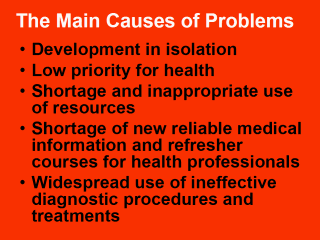 |
Under 70 years of
communist rule soviet medicine was undergoing development in isolation. The
contacts with the outside world were minimal and could not have any tangible
impact on medical science and public health care system. Even one article
about benefits of a new drug written by one or few famous Soviet professors
could have a big influence on clinical practice of many physicians even if
the conclusions were not based on sound scientific evidence.
Regarding low priority for health, we can give the following figures:
Georgia spent only 0.59% GPD on health in 1999. According to the World Bank
the same year only about 22% of all health care expenditure came from state
or municipal budgets or insurance funds (source: Health Care Systems in
Transition: Georgia). |
